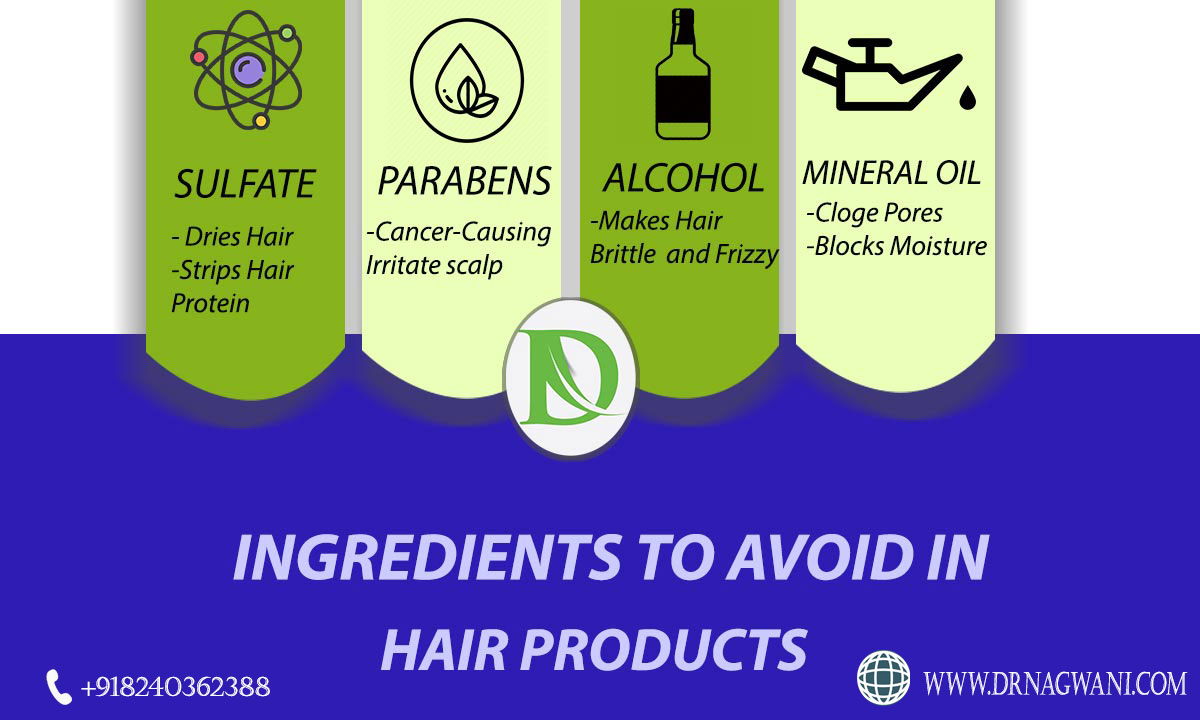Table of Contents
Introduction
Understanding the elements in our hair products is crucial. Not only do they impact our hair’s appearance, but they significantly influence its overall health. In this comprehensive guide by Dr. Nagwani, we delve into the dangers posed by various ingredients commonly found in hair care products.
Importance of Knowing Ingredients to avoid in hair products
Understanding what ingredients to avoid in hair products is vital. It facilitates informed decision-making, enabling an understanding of how these components affect your hair’s health and appearance.
Overview of Harmful Ingredients in Hair Products
Numerous commonly used ingredients can detrimentally affect your hair. From sulfates to parabens and artificial colorants, these substances can cause dryness, irritation, and potentially severe long-term damage.
Impact on Hair Health and Overall Well-being
The repercussions of these harmful ingredients extend beyond the hair, impacting the health of the scalp and even having broader implications for overall well-being.
Understanding Harmful Ingredients
Sulfates and their Effects on Hair
Sulfates, recognized for their cleansing properties, can be harsh on hair, stripping it of natural oils and causing dryness and potential damage.
Parabens and Their Risks
Widely used as preservatives, parabens have raised concerns due to their potential disruption of hormone balance and associated health risks.
Silicones: The Pros and Cons for Hair
Silicones in hair products offer immediate shine and smoothness, enhancing the hair’s appearance. However, prolonged use can lead to product buildup, making the hair heavy and difficult to manage. Their benefits include temporary beautification, yet they can result in long-term challenges due to residue accumulation.
Isopropyl Alcohol: Its Drying Effect on Hair
Isopropyl alcohol, a common ingredient in hair products, can have a drying effect on hair. Prolonged use can lead to dryness, making hair more susceptible to frizz and damage. It’s essential to be mindful of products containing this ingredient to maintain healthy, well-moisturized hair.
Mineral Oil: Impact on Moisture Retention
Mineral oil in hair products can hinder moisture absorption, leaving hair dry and more susceptible to damage. It forms a barrier, preventing moisture from penetrating the hair shaft, potentially resulting in dehydration and increased vulnerability to various types of harm.
Artificial Colorants: Risks and Concerns
Artificial colorants in hair products pose risks like scalp irritation and potential allergic reactions. These synthetic dyes, often hidden in formulations, can trigger sensitivity, leading to discomfort and adverse skin responses, necessitating caution when using products containing these colorants.
The Dangers of Formaldehyde in Hair Products
Formaldehyde, a preservative found in hair products, poses severe risks. Its release of gas can irritate and potentially lead to serious health concerns. Exposure to this compound raises alarms due to its known irritant properties and potential as a carcinogen, warranting caution in product selection.
Health Implications of Coal Tar in Hair Treatments
Found in certain anti-dandruff shampoos, coal tar is associated with health concerns and should be used cautiously.
Synthetic Fragrances and Their Potential Risks
Synthetic fragrances, concealed as “fragrance,” pose potential risks. These undisclosed components may contain allergens or chemicals, causing scalp irritation. They often contribute to skin sensitivity or allergic reactions. Understanding these hidden elements is crucial for individuals sensitive to fragrances or seeking products free from such irritants.
Choosing Safe Alternatives
Natural and Organic Ingredients: Benefits for Hair Care
Natural and organic ingredients offer a boon to hair care. These elements, derived from nature, provide a safer and gentler alternative. Their purity promotes healthier hair and scalp, nourishing and revitalizing without the harsh effects commonly associated with synthetic compounds. These ingredients enhance hair quality while minimizing potential adverse impacts on both hair and overall health.
Reading Labels: How to Identify Safe Products
Understanding product labels is pivotal in selecting safe hair care items. Look for natural ingredients like essential oils, shea butter, or aloe vera, avoiding sulfates, parabens, and artificial fragrances. Opt for products labeled “sulfate-free,” “paraben-free,” and “natural” to make informed, hair-friendly choices.
DIY Hair Products: Making Your Own Safe Formulations
Creating your DIY hair products ensures complete control over the ingredients used, promoting a safer and personalized approach to hair care. Mixing natural components like oils, aloe vera, and essential oils allows customization based on hair type and specific needs, ensuring a healthier and chemical-free hair care regimen.
Impact of Harmful Ingredients on Hair
Effects on Different Hair Types and Textures
Various hair types and textures react uniquely to harmful ingredients. For instance, dry and curly hair might suffer increased frizz, while oily hair could experience product buildup. Straight hair might become dull, and colored hair could face rapid fading or damage. Understanding these diverse reactions helps tailor specific care routines for each hair type.
Long-term Consequences of Prolonged Use
Prolonged use of harmful hair product ingredients can lead to severe and sometimes irreversible damage to both the hair and scalp. Over time, these substances can weaken the hair, causing dryness, breakage, and potential scalp issues, affecting the overall health and appearance of the hair.
Solutions for Repairing Damage Caused by Harmful Ingredients
Offering solutions to help repair and restore hair after exposure to detrimental substances.

Conclusion
Summarizing the discussed key points, Dr. Nagwani emphasizes the importance of making informed choices in hair care and encourages readers to be vigilant about the ingredients they expose their hair to.
FAQs (Frequently Asked Questions)
Do All Products Containing These Ingredients Harm Hair?
Not all products may cause immediate harm, but prolonged use can have adverse effects.
Can Harmful Ingredients Affect the Scalp?
Absolutely, the scalp can be affected, leading to dryness, irritation, and sometimes more severe conditions.
Are There Any Government Regulations Regarding These Ingredients?
Regulations might vary, but some regions have set limits or warnings about certain harmful ingredients.
How Quickly Can One Notice Changes After Avoiding These Ingredients?
Results can vary, but a transition to safer products might show improvements in a few weeks.
Are Natural Products Always Safe for Hair?
While generally safer, individual allergies or reactions can occur. Patch-testing is crucial.
How Can I Detox My Hair from Previous Product Build-up?
Using clarifying shampoos or natural remedies can help remove product build-up, detoxifying the hair.



